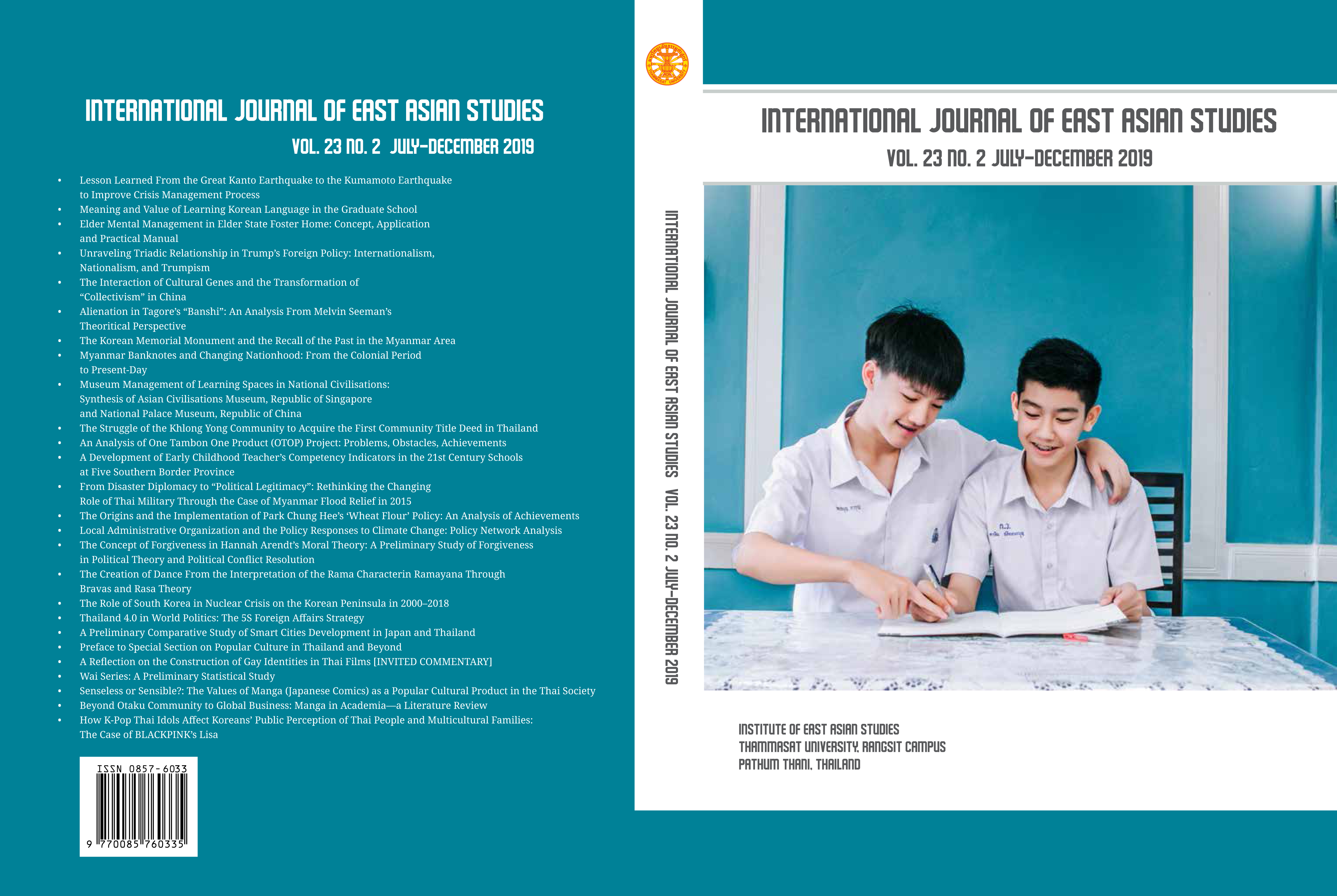องค์กรปกครองส่วนท้องถิ่นกับนโยบายการรับมือการเปลี่ยนแปลงสภาพภูมิอากาศ: บทวิเคราะห์เครือข่ายความสัมพันธ์เชิงนโยบาย
คำสำคัญ:
การเปลี่ยนแปลงสภาพภูมิอากาศ, เครือข่ายนโยบาย, นโยบาย, องค์กรปกครองส่วนท้องถิ่นบทคัดย่อ
บทความนี้มุ่งวิเคราะห์นโยบายการรับมือต่อการเปลี่ยนแปลงสภาพภูมิอากาศขององค์กรปกครองส่วนท้องถิ่น โดยมุ่งเน้นการอธิบายความสัมพันธ์ของการพัฒนาเมืองและการรับมือต่อการเปลี่ยนแปลงสภาพภูมิอากาศว่าเป็นประเด็นปัญหาเชิงนโยบายที่มีความสอดคล้องอย่างใกล้ชิดกัน โดยพบว่านโยบายการรับมือต่อการเปลี่ยนแปลงสภาพภูมิอากาศของไทยมีลักษณะเชิงรับ บทบาทขององค์กรปกครองส่วนท้องถิ่นหรือเมืองยังไม่เด่นชัดนัก แต่ก็เห็นร่องรอยลักษณะของความพยายามรับมือต่อสภาพปัญหา ในขณะที่ระดับชาติ มีแผนแม่บทระดับชาติ (National Master Plan) ที่มีความเชื่อมโยงกับแผนในระดับท้องถิ่นน้อย ในด้านความสัมพันธ์ของตัวแสดง รัฐและกลไกรัฐ มิได้มีลักษณะที่เป็นอันหนึ่งอันเดียวกัน มีความหลากหลายในการแสดงบทบาทภายใต้กลไกระดับชาติและระดับท้องถิ่น จะพบเห็นบทบาทขององค์กร กลุ่มเคลื่อนไหว เครือข่ายนักวิชาการ ในการผลักดันประเด็นวาระทางนโยบาย ดังนั้น บทบาทขององค์กรปกครองส่วนท้องถิ่นในการรับมือต่อการเปลี่ยนแปลงสภาพภูมิอากาศจึงมิใช่เพียงการมุ่งเน้นแต่เรื่องความสามารถในการรับมือกับปัญหาเท่านั้น แต่ต้องให้ความสำคัญกับความสามารถในการบริหารจัดการเครือข่ายทางนโยบายด้วย
Downloads
เอกสารอ้างอิง
ชล บุนนาค. (2554). การสำรวจองค์ความรู้เรื่อง แนวคิดว่าด้วยการจัดการทรัพยากรร่วม: ประสบการณ์จากต่างประเทศ และแนวคิดในประเทศไทย. กรุงเทพฯ.
วสันต์ เหลืองประภัสร์. (2553). การบริหารปกครองกับความสัมพันธ์ระหว่างหน่วยงานของรัฐ. ใน การบริหารปกครองสาธารณะ: การบริหารรัฐกิจในศตวรรษที่ 21 (หน้า 62-84). กรุงเทพฯ: เคล็ดไทย.
พัชราภา ตันตราจิน. (2556). อำนาจรัฐในการใช้เครื่องมือนโยบายและการจัดการสิ่งแวดล้อมของไทย. ใน สิ่งแวดล้อมไทยในกระแสโลกาภิวัตน์ (หน้า 70-76). กรุงเทพฯ: ชุมนุมสหกรณ์การเกษตรแห่งประเทศไทย จำกัด.
นครินทร์ เมฆไตรรัตน์. (2549). รายงานวิจัยฉบับสมบูรณ์ ต้นแบบบันทึกข้อตกลงเพื่อการจัดกลุ่มพื้นที่การให้บริการขององค์กรปกครองส่วนท้องถิ่น. กรุงเทพฯ: บริษัท มิสเตอร์ก๊อปปี้ (ประเทศไทย) จำกัด.
เอกลักษณ์ ณัถฤทธิ์, และ จักรกฤษณ์ นรนิติผดุงการ. (2561). การศึกษาการกำหนดนโยบายรองรับการเปลี่ยนแปลงสภาพภูมิอากาศของไทย. วารสารวิชาการศิลปศาสตร์ประยุกต์, 3-14.
สุธาวัลย์ เสถียรไทย. (2554). ธรรมาภิบาลและกระบวนการนโยบายสาธารณะในการจัดการทรัพยากรธรรมชาติและสิ่งแวดล้อมของไทย. กรุงเทพฯ: โรงพิมพ์เดือนตุลา.
สำนักงานนโยบายและแผนพลังงาน. (20 กุมภาพันธ์ 2559). เข้าถึงได้จาก www.eppo.go.th: http://www.eppo.go.th/index.php/th/plan-policy/climatechange/unitednation/unfccc
สำนักงานคณะกรรมการส่งเสริมการลงทุน. (2562). คู่มือการขอรับการส่งเสริมการลงทุน 2562. กรุงเทพฯ: สำนักงานคณะกรรมการส่งเสริมการลงทุน.
เอกสารภาษาอังกฤษ
Kingdon, J. (1995). Agenda, Alternatives, and Public Policies. New York: Happer Collins College Publishers.
Lasswell, H. D. (1956). The Decision Process: Seven Categories of Functional Analysis. College Park, Maryland: Bureau of Governmental Research, College of Business and Public Administration, University of Maryland.
Radin, B. (2003). The Instruments of Intergovernmental Management. In B. Guy Peters, & Jon Pierre, Handbook of Public Administration. London: Sage.
Sabatier, P., & Jenkins-Smith, H. (1999). The Advocacy Coalition Framwork: An Assessment. In P. Sabatier, Theories of the Policy Process. Boulder, CO: Westview Press.



